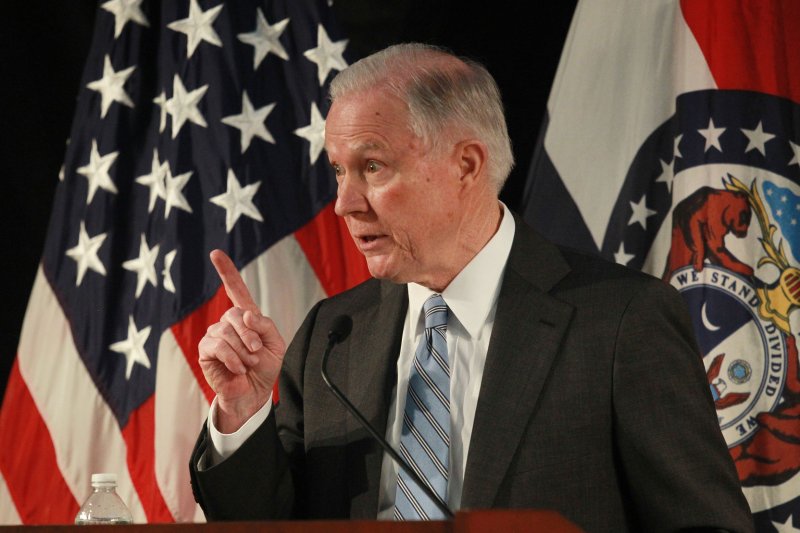U.S. Attorney General Jeff Sessions speaks to law enforement officials during a visit in St. Louis on March 31. In a statement released Monday, Sessions will end a Justice Department partnership with independent scientists and plans an in-house team of law enforcement advisers. Photo by Bill Greenblatt/UPI |
License Photo
April 10 (UPI) -- Attorney General Jeff Sessions on Monday announced the Justice Department will not renew its partnership with the National Commission on Forensic Science, which began in 2013.
The 30-member commission includes scientists, judges, crime lab leaders, prosecutors and defense lawyers. The Obama administration formed the partnership in 2013.
The commission's two-year term expires April 23 and it is meeting Monday and Tuesday.
In place of the commission, Sessions plans to name a senior forensic adviser and internal department crime task force, according to a filing in the Federal Register.
"The availability of prompt and accurate forensic science analysis to our law enforcement officers and prosecutors is critical to integrity in law enforcement, reducing violent crime, and increasing public safety," Sessions said in the register statement. "We applaud the professionalism of the National Commission on Forensic Science and look forward to building on the contributions it has made in this crucial field."
Sessions, who previously was a U.S. senator from Alabama, said forensic evidence is important for the entire criminal justice system.
"It is the department's mission to ensure public safety and provide federal leadership in preventing and controlling crime," Sessions said. "Advancing the practice of forensic science is an important part of that effort. The more effective a forensic system we have, the better equipped we are to solve crimes, more swiftly absolving the innocent and bringing the guilty to justice."
But Sessions noted the need to survey crime lab workloads and equipment nationwide.
"As we decide how to move forward, we bear in mind that the department is just one piece of the larger criminal justice system and that the vast majority of forensic science is practiced by state and local forensic laboratories and is used by state and local prosecutors," Sessions said in the statement.
Six commission members on the panel sought to extend the commission for another two years.
"For too long, decisions regarding forensic science have been made without the input of the research science community," they said in a letter obtained by The Washington Post.
They added: "Limiting the 'relevant scientific community' to forensic practitioners is a disservice to that field and to the criminal justice system."
The six were led by Thomas D. Albright, an internationally recognized neuroscientist specializing in vision and the brain at the Salk Institute for Biological Studies.
The only federal judge on the commission, U.S. District Judge Jed S. Rakoff of New York, told The Washington Post, "it is unrealistic to expect that truly objective, scientifically sound standards for the use of forensic science ... can be arrived at by entities centered solely within the Department of Justice."
The National District Attorneys Association, which represents prosecutors, in House testimony urged the commission to be replaced by an Office of Forensic Science inside the Justice Department. It said the commission only served as "a think tank."
The commission had been considering two proposals. One would set written standards on forensic evidence in criminal courts across the country and the other to fully disclose statistical results' limits.
Over the past week, the Justice Department has been busy attempting to distance itself from Obama-era arrangements. On Friday, a federal judge ratified a consent decree that orders sweeping reforms of the Baltimore Police Department -- a measure submitted at the end of former President Barack Obama's tenure. The Justice Department under Sessions sought to delay signing the agreement for at least 30 days so officials could review the deal.















